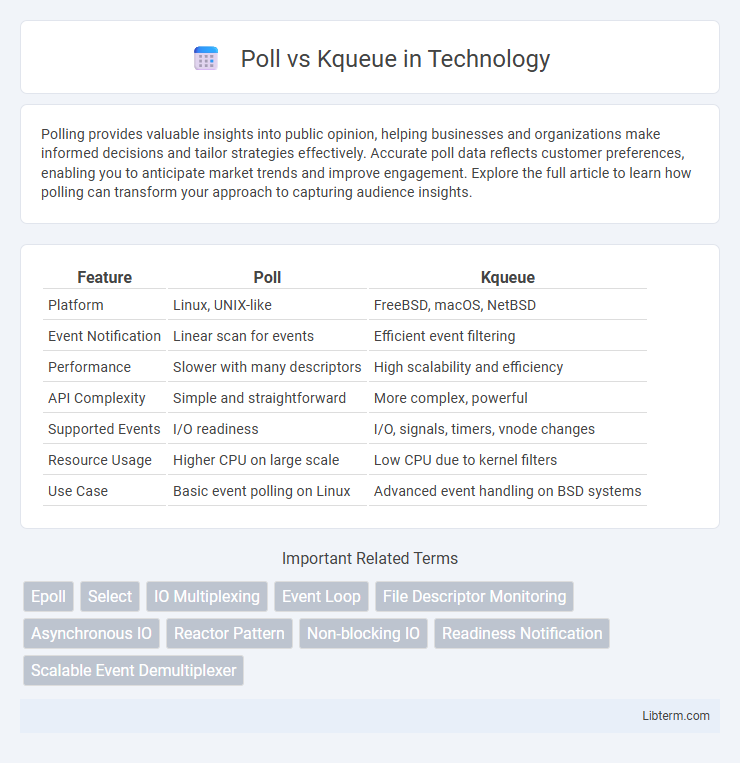Polling provides valuable insights into public opinion, helping businesses and organizations make informed decisions and tailor strategies effectively. Accurate poll data reflects customer preferences, enabling you to anticipate market trends and improve engagement. Explore the full article to learn how polling can transform your approach to capturing audience insights.
Table of Comparison
| Feature | Poll | Kqueue |
|---|---|---|
| Platform | Linux, UNIX-like | FreeBSD, macOS, NetBSD |
| Event Notification | Linear scan for events | Efficient event filtering |
| Performance | Slower with many descriptors | High scalability and efficiency |
| API Complexity | Simple and straightforward | More complex, powerful |
| Supported Events | I/O readiness | I/O, signals, timers, vnode changes |
| Resource Usage | Higher CPU on large scale | Low CPU due to kernel filters |
| Use Case | Basic event polling on Linux | Advanced event handling on BSD systems |
Introduction to Poll and Kqueue
Poll and Kqueue are scalable I/O event notification mechanisms used in Unix-like operating systems to monitor multiple file descriptors. Poll operates by checking an array of file descriptors to identify readiness, suitable for moderate numbers but with performance degradation as the descriptor count grows. Kqueue, available on BSD variants and macOS, uses an event-driven kernel notification system that provides efficient monitoring of large sets of descriptors with minimal overhead.
Overview of Event Notification Mechanisms
Poll and Kqueue are event notification mechanisms used in operating systems to efficiently monitor multiple file descriptors for I/O readiness. Poll operates by scanning an array of file descriptors and checking their status, which can lead to performance degradation as the number of descriptors increases. Kqueue, available primarily on BSD systems, employs a more scalable and efficient event-driven model by allowing the kernel to notify the application only when specified events occur, reducing overhead and improving responsiveness.
How Poll Works
Poll operates by monitoring an array of file descriptors for various I/O events, efficiently handling multiple simultaneous connections without the need to repeatedly modify the array. It uses a linear scan to detect which file descriptors are ready for I/O operations, returning a list of active descriptors to the application. Unlike select, poll supports larger numbers of descriptors but can suffer performance degradation as the descriptor count increases due to its O(n) complexity.
How Kqueue Works
Kqueue operates as an event notification interface primarily for BSD-based systems, efficiently monitoring numerous file descriptors by registering specific event filters such as read, write, or timer events. It uses an event-driven mechanism where the kernel maintains a list of events and delivers notifications only when registered events occur, minimizing system calls and enhancing performance under high concurrency. Unlike poll, which scans all descriptors sequentially, kqueue provides scalable and low-latency event handling by reporting only active events, reducing CPU usage and improving responsiveness in network applications.
Poll vs Kqueue: Performance Comparison
Kqueue offers better performance than Poll in managing large numbers of file descriptors due to its event-driven notification mechanism, which minimizes CPU usage and system calls. Poll scans all monitored file descriptors each time it executes, causing increased overhead and latency as the number of descriptors grows. Benchmarks show kqueue scales more efficiently in high-concurrency environments, resulting in lower latency and higher throughput.
Scalability Differences
Poll uses a linear scanning approach to monitor file descriptors, causing its performance to degrade significantly as the number of descriptors increases, making it less scalable for large-scale systems. Kqueue, designed for BSD-based systems, employs an event notification mechanism that scales efficiently with thousands of descriptors by only reporting active events, minimizing CPU overhead. This architectural difference allows kqueue to maintain high performance and scalability in environments with numerous concurrent connections or file events.
Platform Support and Compatibility
Poll is broadly supported across most Unix-like systems, including Linux, macOS, and BSD variants, offering compatibility with a wide range of platforms but with less efficient scaling for large numbers of file descriptors. Kqueue, designed specifically for BSD systems such as FreeBSD, OpenBSD, and macOS, provides more efficient event notification with better scalability but lacks native support on Linux and non-BSD platforms. Developers targeting cross-platform applications often favor Poll for its universal availability, while kqueue is preferred for performance optimization on BSD-based systems.
Use Cases for Poll
Poll is ideal for applications with a moderate number of file descriptors, where simplicity and portability are prioritized over performance. It efficiently manages I/O readiness in server applications like web servers, network proxies, and event-driven programs with fewer simultaneous connections. Poll's straightforward API allows easy integration in cross-platform environments, making it suitable for scenarios without the need for high scalability or complex event notification systems.
Use Cases for Kqueue
Kqueue is optimized for high-performance event notification in BSD-based systems, making it ideal for network servers and applications requiring efficient monitoring of multiple file descriptors with minimal overhead. It excels in handling large-scale I/O events, such as in real-time data processing, where low-latency responses are critical. Compared to poll, kqueue delivers better scalability and reduced CPU usage in environments with numerous concurrent connections.
Choosing the Right Mechanism for Your Application
Choosing between Poll and Kqueue depends on the specific requirements of your application, such as the number of file descriptors and the target operating system. Poll works universally across platforms but may face performance bottlenecks with large descriptor sets, while Kqueue, native to BSD systems, offers scalable, efficient event notification ideal for high-concurrency scenarios. Optimizing event-driven applications requires aligning the event notification mechanism with system capabilities and workload characteristics to maximize responsiveness and resource utilization.
Poll Infographic

 libterm.com
libterm.com